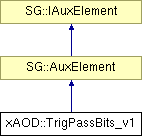#include <TrigPassBits_v1.h>

Public Member Functions | |
| TrigPassBits_v1 () | |
| Default constructor. | |
Helper functions for easier usage | |
| template<class CONT > | |
| void | reset (const CONT *container, uint32_t containerKey=0xffff) |
| Function configuring and resetting the object for a new target. | |
| template<class OBJ , class CONT > | |
| void | markPassing (const OBJ *obj, const CONT *container, bool passed=true) |
| Mark one of the elements of the target container as passing/failing. | |
| void | markPassing (size_t index, bool passed=true) |
| Mark one of the elements of the target container as passing/failing. | |
| template<class OBJ , class CONT > | |
| bool | isPassing (const OBJ *obj, const CONT *container) const |
| Check if an element of a container is passing/failing. | |
| bool | isPassing (size_t index) const |
| Check if an element of a container is passing/failing. | |
Raw data accessors | |
| uint32_t | size () const |
| The size of the target container. | |
| void | setSize (uint32_t value) |
| Set the size of the target container. | |
| const std::vector< uint32_t > & | passBits () const |
| The internal bitmap created with the hypo decisions. | |
| void | setPassBits (const std::vector< uint32_t > &value) |
| Set the internal bitmap directly (not recommended). | |
| uint32_t | containerKey () const |
| Hashed SG key of the target container. | |
| void | setContainerKey (uint32_t value) |
| Set the hashed SG key of the target container. | |
| uint32_t | containerClid () const |
| CLID of the target container. | |
| void | setContainerClid (uint32_t value) |
| Set the CLID of the target container. | |
Type describing which elements in a container passed a trigger chain
This type allows us to attach simple pass/fail information to the containers that we reconstructed in Fex algorithms, in Hypo algorithms. In this case we can't just decorate the original objects, as we may want to evaluate a lot of hypotheses on the exact same objects.
| bool xAOD::TrigPassBits_v1::isPassing | ( | size_t | index | ) | const |
Check if an element of a container is passing/failing.
Non-template function for checking the state of an object with a given index inside the container.
| index | The index of the object to check the state of |
| bool xAOD::TrigPassBits_v1::isPassing | ( | const OBJ * | obj, | |
| const CONT * | container | |||
| ) | const [inline] |
Check if an element of a container is passing/failing.
The same comment applied as for the markPassing function. In order to avoid clashes with the non-template function, I had to use pointer arguments for the function.
| obj | The objects whose state we should check | |
| container | The container that the object is part of |
| void xAOD::TrigPassBits_v1::markPassing | ( | size_t | index, | |
| bool | passed = true | |||
| ) |
Mark one of the elements of the target container as passing/failing.
Non-template function for marking an element with the specified index as passing/non-passing. Performs fewer checks than the template function, so should be used with care.
| index | The index of the object to set the state of | |
| passed | The "passing state" of the object with the specified index |
| void xAOD::TrigPassBits_v1::markPassing | ( | const OBJ * | obj, | |
| const CONT * | container, | |||
| bool | passed = true | |||
| ) | [inline] |
Mark one of the elements of the target container as passing/failing.
Tried to use const references in the arguments, but then the function overload broke. So instead of providing template and non-template functions with slightly different names, decided to use pointers in the interface instead.
| obj | The object whose state should be set | |
| container | The container that the object is part of | |
| passed | The "passing state" of the specified object |
| void xAOD::TrigPassBits_v1::reset | ( | const CONT * | container, | |
| uint32_t | containerKey = 0xffff | |||
| ) | [inline] |
Function configuring and resetting the object for a new target.
This function is used to initialise or reset the object, to describe a target container. It sets up all the internal variables of the object so that subsequent maskPassing/isPassing calls would succeed.
| container | Pointer to the container that this object should describe | |
| containerKey | A unique key describing the target container. (The sub-type index from the trigger navigation.) |
 1.6.1
1.6.1